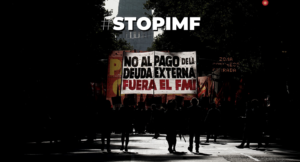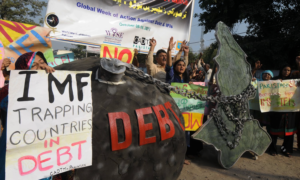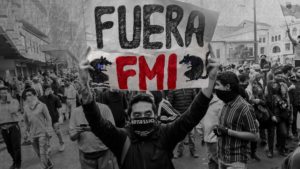The International Monetary Fund, which was born in 1944 in the Bretton Woods agreements, has been one of the main forces that imposed the neoliberal agenda on the entire planet1, since the 1970s, conditioning its loans on austerity measures. And the current health crisis has not meant any change in this regard.
An analysis carried out by OXFAM of 91 loans made by the IMF to countries during the pandemic2 reveals that at least 76 of them were conditioned to wage freezes and cuts in public health, in pension systems, in the public sector (doctors or teachers included) or unemployment benefits, all of which are seriously needed services during these times. As an example of some of the measures indicated in the report, we can see the following:
- In Ecuador, despite the collapse of the country’s health system, the IMF has recommended reducing health care expenditures and payments to unemployed people, in exchange for its $ 6.5 billion loan.
- In Angola, Nigeria and seven other countries, value added taxes will be increased, which mainly affect the poorest people, despite the fact that unemployment in Nigeria has increased by 27 percent.
- In fourteen countries, including Barbados, El Salvador, Lesotho or Tunisia, salaries of civil servants will be paralyzed or reduced, despite the fact that countries like Tunisia have only 13 doctors for every 10,000 people.
These measures are even more reprehensible when the IMF itself has acknowledged the failure of its policies in several of its own reports, saying that Neoliberalism has been “over-promoted”3 or that its experiments in Latin America were “all pain, no benefits”4. However, it is re-applying its same recipes in one of the biggest health crises in recent times.
Although the IMF is one of the most powerful actors in the global arena, it is not the only agent promoting austerity on the planet. The European Union, for example, is going to launch its “NEXT GENERATION EU”5, the largest bailout in its history, of 750,000 million euros, also conditional on this type of policy. Faced with austericide, the best solution that we impoverished classes have is mobilization and legitimate non-payment of illegitimate and cruel debts. Other countries, such as Iceland6 or Ecuador7, have shown that fighting austerity and debt is possible. We don’t owe, we don’t pay!
1 https://www.jstor.org/stable/4621699?seq=1 2 https://oi-files-d8-prod.s3.eu-west-2.amazonaws.com/s3fs-public/2020-10/IMF%20COVID%20Financing%20Tracker%20FINAL%20Oct%2010.pdf 3 https://www.imf.org/external/pubs/ft/fandd/2016/06/pdf/ostry.pdf 4 https://www.imf.org/external/pubs/ft/fandd/2016/06/pdf/ostry.pdf 5 https://ec.europa.eu/info/live-work-travel-eu/health/coronavirus-response/recovery-plan-europe/pillars-next-generation-eu_es 6 https://www.cadtm.org/Islandia-Si-la-deuda-no-puede 7 https://www.cadtm.org/Ecuador-los-pueblos-exigen-ser
More Information:
Become Interest:
WHAT IS REPRESSION AND HOW TO FIGHT IT?


